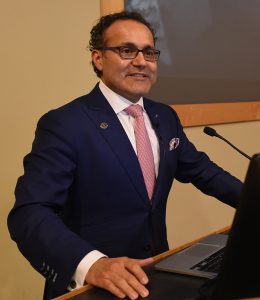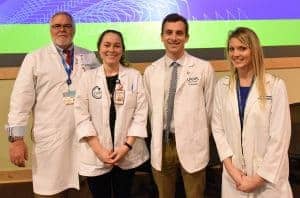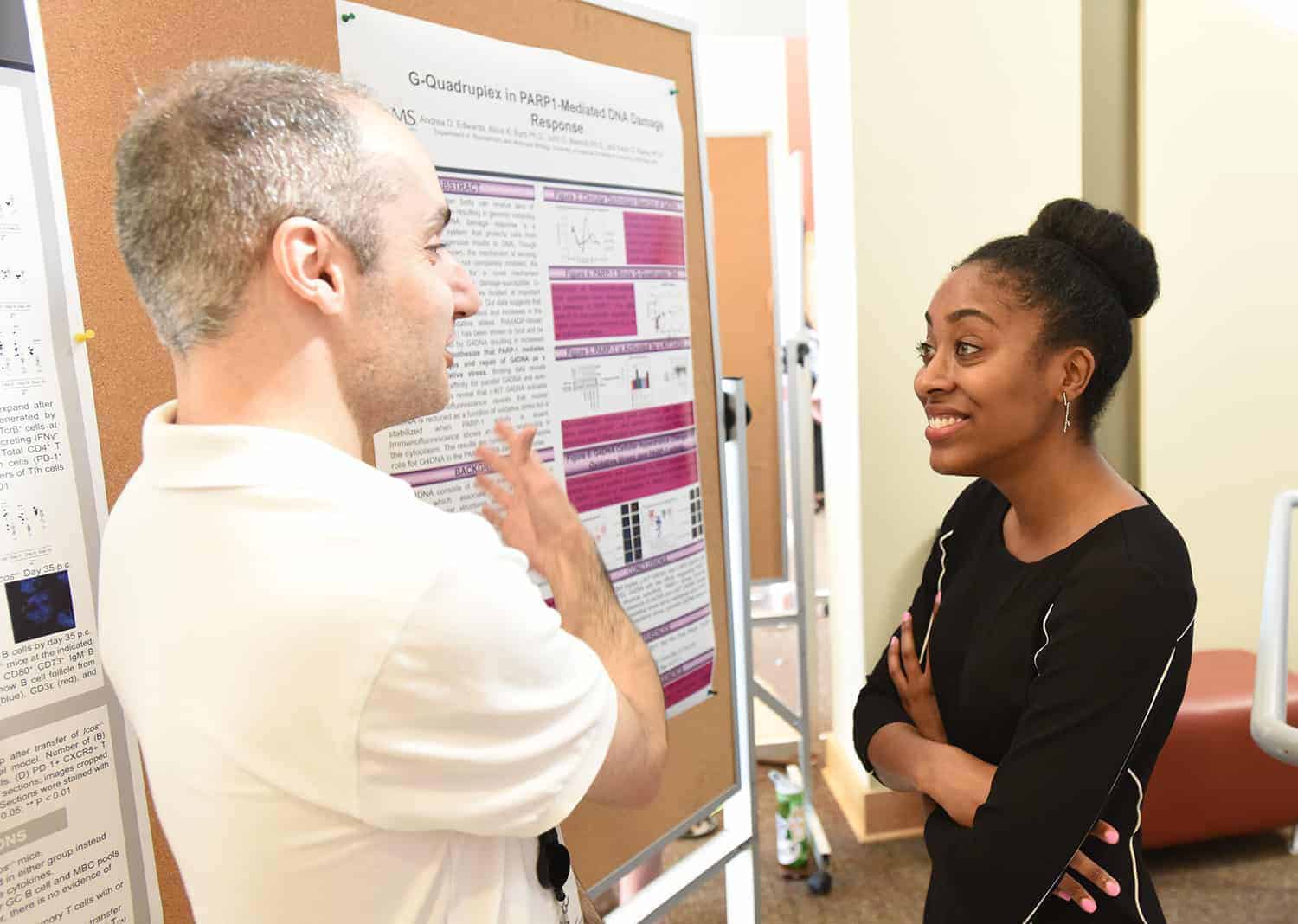Relationships, Communication Touted as Key at Student Research Day
| March 9, 2018 | Student Research Day is about students, but it is also about mentorship and peer engagement – the relationships that turn hunches and ideas into innovations.
Robert E. McGehee Jr., Ph.D., dean of the UAMS Graduate School, said as much as he welcomed everyone to the event, and the day’s distinguished lecturer, Alfredo Quiñones-Hinojosa, M.D., echoed that sentiment repeatedly throughout his talk.
“Being pushed by your students is one of the greatest gifts, and I ask you guys to do the same. Push your mentors. We need to be pushed,” Quiñones said, detailing an instance in which a grad student’s perspective solved a longtime problem for Quiñones’ team and resulted in two patents, several papers and a human clinical trial over the span of about 10 years. They developed a $30,000 ring-like device to be used during brain surgeries to preserve function for the patient. It replaces the older multi-million-dollar device, making the technology more accessible.

Alfredo Quiñones-Hinojosa, M.D., a internationally known neuroscientist and neurosurgeon, provided this year’s Robert E. McGehee Jr., Ph.D., Distinguished Lectureship in Biomedical Research.
Quiñones is the William J. and Charles H. Mayo Professor and Chair of Neurologic Surgery in the Brain Tumor Stem Cell Research Laboratory at the Mayo Clinic in Jacksonville, Florida. Previously, he served as a neuroscientist and neurosurgeon at Johns Hopkins Hospital in Baltimore, Maryland, for more than a decade. His life’s work has been dedicated to finding a cure for brain cancer.
Quiñones came to the United States as an undocumented immigrant from Mexico in 1987 at the age of 19. He was unable to speak English and worked as a field hand, painter and welder, but soon set his sights on something bigger, eventually graduating from college and Harvard Medical School.
During medical school, Quiñones became a U.S. citizen. He has had more than 350 publications, has four concurrent active NIH R01 grants and performs 200-250 neurosurgeries per year.
When asked to account for the secret behind his success, Quiñones cited the team of scientists who have come through his lab over the years – 150 people in total, 28 of whom moved with him when he moved from Johns Hopkins to Mayo. Quiñones also attributed his accomplishments to “the beauty of this country.”
“It’s very important for us to build bridges,” Quiñones said. “The rest of the world wants us to build barriers, but we know that the world doesn’t change when we build barriers. It only changes when we build bridges, when we exchange information and communication.”

Graduate School Dean Robert E. McGehee Jr., Ph.D., welcomes the crowd to the lecture named in his honor.
Student Research Day is an annual campuswide opportunity for students to practice building those bridges by communicating about their research through poster presentations and the Three Minute Thesis challenge, during which they develop an “elevator pitch” of their work. The event has been paired since 2011 with the Robert E. McGehee, Jr., Ph.D. Distinguished Lectureship in Biomedical Research, named in McGehee’s honor. It was held March 6 in the I. Dodd Wilson Education Building.
The lectureship brings some of the most innovative thinkers in science to UAMS, thanks to an endowment from an anonymous couple. McGehee mentored their grandson during Graduate School.
“It was amazing and humbling to be honored in this way,” McGehee said, “and I tell that story to let you know that you never know who will be affected by your actions and your work. The relationships you build can change the future for the better.”

For the first time this year, there were no classes on Student Research Day so everyone could feel free to participate. Attendance shattered records.
For the first time this year, there were no classes so students could feel conflict-free in attending Student Research Day. McGehee thanked the students for using the opportunity to hone their research communication skills.
“Turnout has been absolutely phenomenal,” McGehee said. “You guys have really stepped up and participated and made it a big success.”
A record-shattering 500+ students across all colleges participated in one or more of the events this year. There were 161 posters in the research presentations, 93 students participated in the Three Minute Thesis oral presentation college semifinals, with eight of them in the final competition held on Student Research Day, and there were 262 students who presented as teams in the Interprofessional Education Triple Aim sessions. More than 400 people attended Quiñones’ keynote.
Emily Enderlin, a third-year student in the College of Medicine, said that she wanted to participate in the event to get feedback from outside eyes about her research, which is about the management of tachyarrhythmia during pregnancy.

McGehee (left) is pictured with the winners of the Three Minute Thesis competition: Ada Sochanska (from left), Ty Spradley and Samantha McClenahan.
“I feel like it builds your character to be able to stand up and present what you’ve done,” Enderlin said. “If your work can survive that, it makes you feel like what you’ve done is worthwhile, like you’re on to something, and that’s the end goal after all. It’s the whole ‘peer review’ concept in a nutshell.”
Meanwhile, Appala Peela, M.D., a first-year resident, presented a Sweet’s Syndrome case study he had come across in the hospital. He was hoping meet others on campus with similar interests.
“This is a big networking opportunity for me,” Peela said.
In addition to touting relationships and communication, Quiñones offered other bits of advice. Some of it was practical – he gets up two hours early every day to write and thinks time management is key – but most was philosophical. Don’t get too comfortable. Look for people who challenge you. Find ways to give back. And have faith that if you believe in something, it will work out.
For many years, Quiñones said he avoided his personal story and just focused on the science. That is, until a colleague convinced him otherwise. So Quiñones established the Mission:BRAIN Foundation to expand neurosurgery internationally, often finding lower-cost approaches to make health care more affordable. His children have helped with the mission, allowing them to learn more about him and his home country in Mexico, where some of the work takes place.
In addition, Quiñones became more willing to share his personal story, which he documented in a 2011 biography, “Becoming Dr. Q: My Journey from Migrant Farm Worker to Brain Surgeon.” Disney and the actor Brad Pitt’s production company, Plan B Entertainment, are developing Quiñones’ book into a movie.
In the face of so many inspiring accomplishments, what should students take away as Quiñones’ main message for success, McGehee asked.
“Sometimes we concentrate on the things that we can’t do and then we tend to lose a lot of energy worrying about those things. I would give the advice to concentrate on the things that you can do, and do them,” Quiñones said. “Get something done.”
Award Recognitions:
POSTER SESSIONS:
Graduate Students:
1-Chris Bolden tied with Samantha McClenahan
2-None
3-Magdalena Delgado
Professional Students:
1-Arun Gunasekaran
2-William Hyatt
3-Ahmed Salem
Post-Docs:
1-Sajid Khan
2-Alicja Urbaniak
3-Clark Trapp
Housestaff/Subspecialty Fellows:
1-Appala Peela
2-Kasa Cooper
3-Cory Couch
Overall (all categories):
1-Chris Bolden tied with Samantha McClenahan
3 MINUTE THESIS:
1-Ada Sochanska
2-Samantha McClenahan
PC-Ty Spradley
IPE TRIPLE AIM AWARDS:
1-Intergrated Behavioral Health Team
2-Mental Health Awareness Team 2
3-Cystic Fibrosis Awareness Team 1
BHUVAN BIOCHEMISTRY AWARDS:
1-Magda Delgado tied with Brian Koss
2-Kirk West
3-Binyan Belachew
